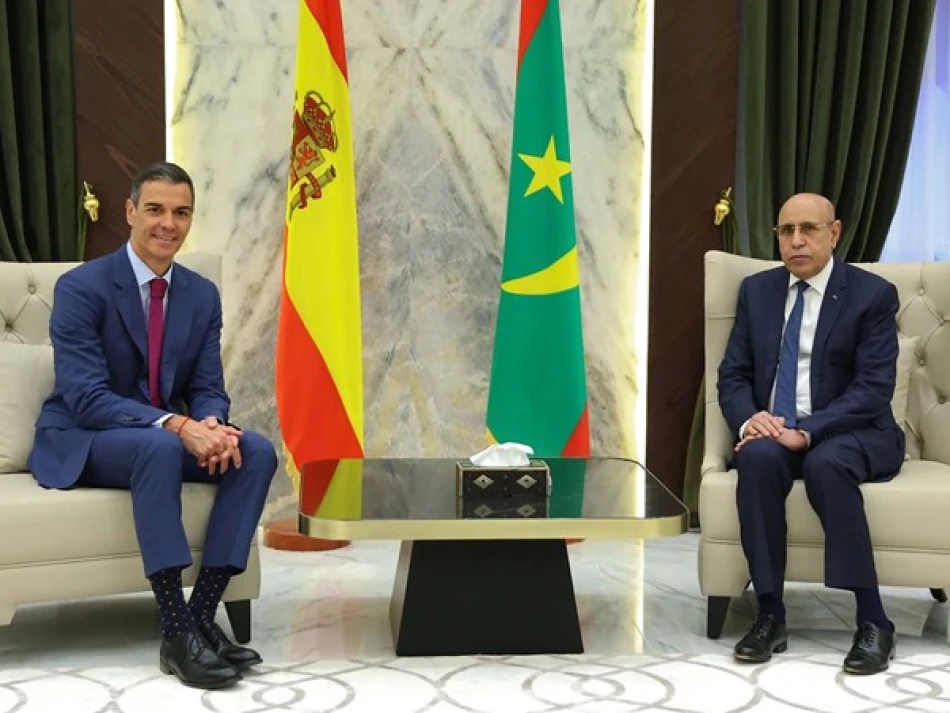
Spain Boosts Investment in Mauritania with €200 Million Backing
Spain Commits €200 Million to Mauritania in Strategic Partnership Push
Spain has announced a €200 million financial package to boost its investments in Mauritania, alongside the launch of a digital platform called "Al-Qantara" (The Bridge) to connect business actors between the two nations. The commitment signals Spain's growing interest in West African markets and energy transition opportunities, particularly as Europe seeks to diversify its resource partnerships beyond traditional suppliers.
High-Level Summit Delivers Concrete Results
The announcement came during the closing session of the first high-level meeting between the two countries, which featured a Mauritanian-Spanish Business Council attended by Mauritanian President Mohamed Ould Sheikh El Ghazouani and Spanish Prime Minister Pedro Sánchez. Unlike many diplomatic gatherings that produce vague commitments, this summit delivered tangible financial pledges and institutional frameworks.
According to the Mauritanian News Agency, the closing session featured concrete announcements and commitments that go beyond typical diplomatic rhetoric.
Spain's €200 Million Investment Strategy
Green Energy Focus Drives Funding
Prime Minister Sánchez outlined how the €200 million package will be distributed across multiple financial instruments: loans for green projects, feasibility study financing, risk coverage tools, and project implementation facilitation. The emphasis on energy transition projects reflects Spain's broader strategy to secure renewable energy partnerships as it phases out fossil fuel dependence.
This approach mirrors similar European initiatives in North Africa, where countries like Germany and France have established green hydrogen partnerships with Morocco and Algeria. Spain's focus on Mauritania suggests recognition of the country's vast solar and wind potential, particularly for green hydrogen production.
Institutional Infrastructure
Spain will appoint its first economic and commercial representative in Mauritania starting September 1st, establishing a permanent institutional presence to oversee business relations. This move indicates Spain's long-term commitment to the partnership, moving beyond ad-hoc diplomatic engagement to systematic economic cooperation.
Mauritania's Investment Pitch
Diversified Opportunity Portfolio
President Ghazouani highlighted Mauritania's broad investment opportunities across productive sectors including fishing, agriculture, livestock development, extractive and mining industries, and infrastructure development covering roads, bridges, airports, and public buildings. The country also emphasized opportunities in services, gas, and minerals sectors.
This diversified approach positions Mauritania as more than just a resource extraction destination, appealing to Spanish companies across multiple industries. The country's strategic location on Africa's Atlantic coast provides natural advantages for trade with Europe and access to broader West African markets.
Strategic Implications for Regional Development
Europe's Africa Strategy
Spain's commitment reflects broader European efforts to strengthen economic ties with Africa through the EU's Global Gateway initiative, which aims to mobilize €300 billion in investments worldwide by 2027. By establishing direct bilateral partnerships, Spain positions itself advantageously within this competitive landscape.
The timing is particularly significant as European countries seek to reduce dependence on Russian energy while building sustainable supply chains. Mauritania's renewable energy potential and mineral resources make it an attractive partner for Spain's energy transition goals.
Digital Platform Innovation
The "Al-Qantara" digital platform represents an innovative approach to business facilitation, potentially serving as a model for other bilateral partnerships. By creating direct digital connections between business communities, Spain and Mauritania are addressing practical barriers that often impede cross-border investment and trade.
This digital infrastructure could prove particularly valuable for small and medium enterprises that lack the resources for extensive international business development, democratizing access to cross-border opportunities.
Most Viewed News

 Layla Al Mansoori
Layla Al Mansoori






